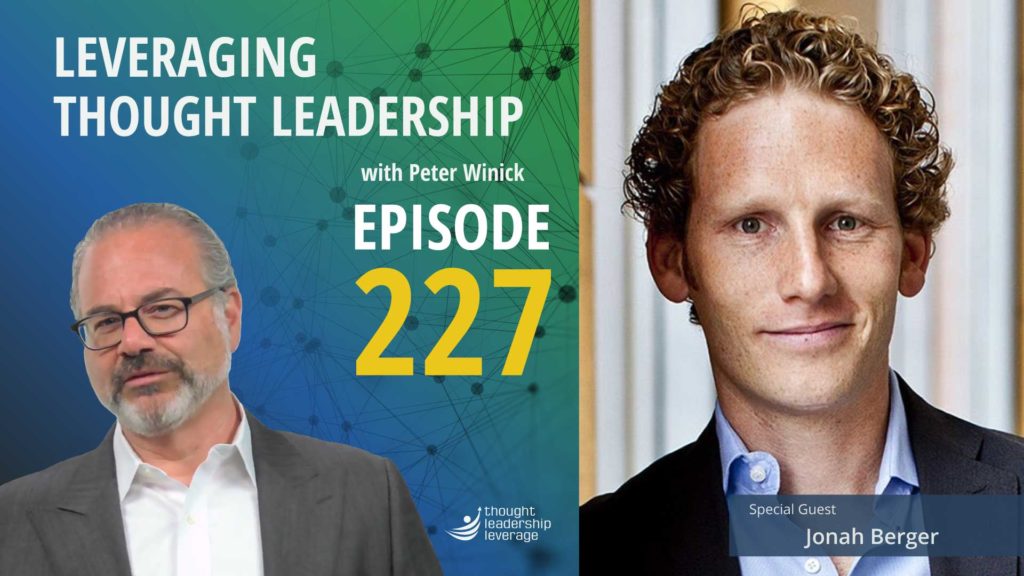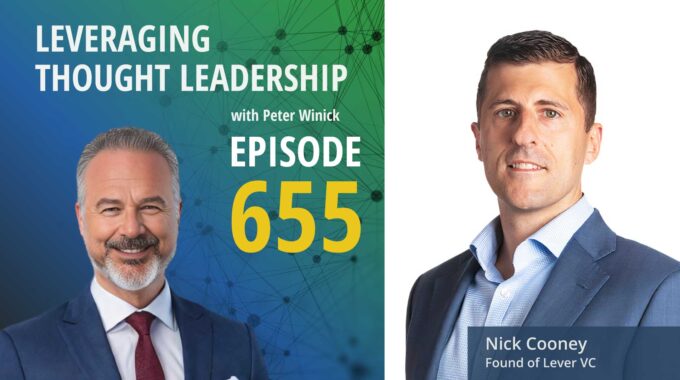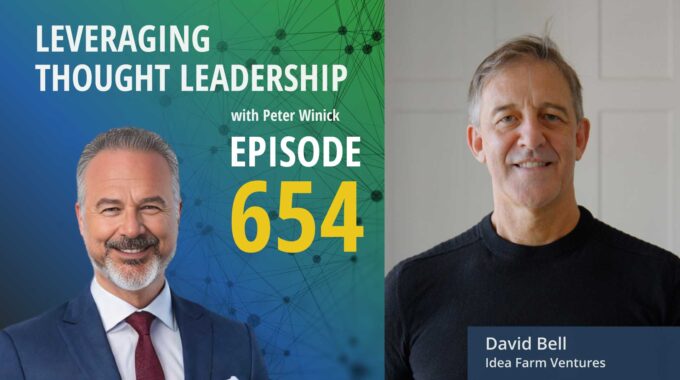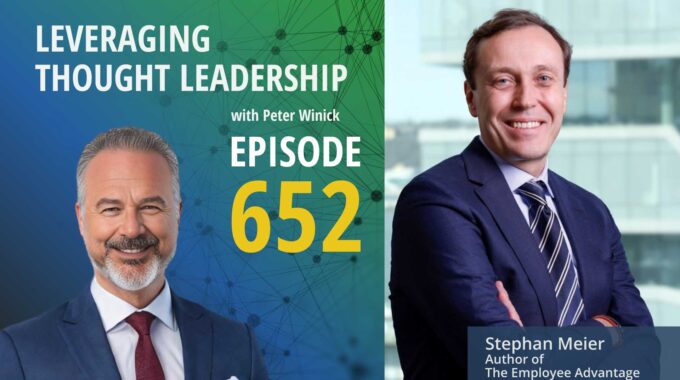How Strategic Content Fuels Growth in Purpose-Led Ventures This episode explores how thought leadership can…
What is a Thought Leadership Consulting Strategy? | Jonah Berger
Building a Thought Leadership Strategy from Academic Work, and Strengthening Your Consulting Strategy
We interviewed Jonah Berger about thought leadership strategy, why thought leadership is important, and how to make the most of your thought leadership content.
Our guest is Jonah Berger, a marketing professor at the Wharton School at the University of Pennsylvania and internationally bestselling author of Contagious, Invisible Influence, and The Catalyst. He is a world expert on change, word of mouth influence, and consumer behavior. Today, we chatted about thought leadership marketing, creating a content marketing strategy, and how to build great thought leadership content.
Jonah takes us through his world as a thought leader and how publishing his book, Contagious opened the door to new opportunities. We discuss the highs and lows of being a speaker and the types of projects he takes on as a consultant. Last but not least, Jonah gives advice on the challenging marketplace both publishers and authors face. This is expert advice you certainly don’t want to miss.
Three Key Takeaways from the Interview:
- Learning from your clients and building thought leadership content from day-to-day.
- How to build thought leadership as you move from academia to thought leadership and content marketing.
- Translating your speaking into content marketing and building a thought leadership strategy.
If you need help with any aspect of your thought leadership, contact Thought Leadership Leverage. We will be glad to assist you starting with a strategy session to discover what you might need.
Transcript:
Peter Welcome, welcome, welcome. This is Peter Winick. I’m the founder and CEO of Thought Leadership Leverage. And you’re joining us on the podcast today, which is leveraging thought leadership. I’m really, really excited today to speak to our guest. Our guest is Jonah Berger, who sort of needs no introduction. But I’ll but I’ll give a brief one anyway. So Jonah is a marketing professor at Wharton. He’s an internationally bestselling author of Contagious Invisible Influence. And The Catalyst Contagious was meant in a different context than the coronavirus world we’re living in. He’s a world expert on change, word of mouth influence, consumer behavior and how products, ideas and behaviors catch on. He’s published a bunch of articles New York Times, Harvard Business Review, etc. And without further ado, I’d like to welcome Jonah on with us today.
Jonah Berger Thanks so much for having me.
Peter So let’s sort of dive in here so you check a lot of the boxes in terms of folks that we work with. So there’s the academia piece, which is critical to what you do. Then there’s the published authors piece and then they’re speaking and in sort of the other things that you do. So. Tell us a little bit about sort of the portfolio mix of your how you spend your time.
Jonah Berger Yeah. So I would say, you know, at the core, I was brought up and taught to be an academic researcher, so, you know, got my PhD from Stanford Graduate School of Business. I have been at work now for 13 years. I have had tenure for the past six or seven and still am very active on the research side at the moment, doing a lot of work on natural language processing and automated text analysis when contagious came out. Now, I guess, wow, seven years ago, yeah, my life changed. That book was about my research and focused on my research and I had done some consulting and speaking before that, but relatively minor. But since then, I’ve had a chance to work with all sorts of companies, organizations from big Fortune 500 like the Googles, Apples and Nike of the world to small startups. I probably speak at between 30 or 50 events a year of varying sizes from, you know, small workshops to multi-thousand folk event and really had an opportunity to learn a lot both about business, about marketing, about leadership and a wide variety of domains from working these different areas. And so now still obviously do a lot of academic research. About half my time is sort of research and teaching and the other half is speaking and consulting.
Peter Got it. So let’s talk about speaking just for a couple of minutes there, because that’s always a topic that’s of interest to people. So, you know, speaking to some that haven’t been there yet is, you know, it’s appealing, it’s sexy, it’s profitable, it looks glamorous, et cetera, et cetera. Well, let’s be easy to just get up on stage and get paid a whole lot of money, you know, to talk about what you love. For an hour. Is that exactly how it looks?
Jonah Berger I wish it was that glamorous. Just let me know when it’s that glamorous. I’ll sign up. It sounds like an advertiser speak almost like when you see an advertisement for an airline. Everyone looks happy. The bags are on time and then your real-life experiences is quite different. You know, there are there are a lot of really fun parts about speaking. I love meeting and working with different industries. I love answering questions. That’s actually my favorite thing. To do. Yeah, because you really get to connect the material to where people are and what they’re wrestling with. But there’s also a lot of less fun parts. You know that the travel’s not particularly fun. You know, saying the same thing sometimes for not the first or second time can get old a little bit. And I also think it’s a different style of presenting ideas. It’s really about thinking, you know, how can we be both entertaining and engaging, but also really provide valuable information in a short time slot. You know, sometimes some will say, oh, we have 30 minutes, you know, can you both entertain people and give them, you know, five key takeaways that they can, you know, transform their business tomorrow. And that’s a big ask in 30 minutes.
Peter No pressure. Yeah. And by the way, there’s four thousand of them. And they were out till 2:00 in the morning last night. Drinking and so. Yes. Good luck with that. Yeah. Yeah. Go.
Jonah Berger Go for it. And so, yeah, there’s the different ties, as you just pointed out, different time slots are more or less challenging. So I know a lot of really great parts and there are also some really challenging parts. But I think the fun for me has been learning that new skill. It’s made me a better teacher. better presenter.
Peter Yep.
Jonah Berger In other contexts, it’s been fun to kind of get better at that area that I wasn’t necessarily as good at to start with.
Peter So talk about sort of two pieces on the business side of speaking. Number one is the sort of deal origination sort of bureaus versus direct. And then the second piece is the weirdness of speaking in terms of the economics where, you know, it’s interesting, you know, theoretically when you buy, you know, a six figure Mercedes, you intuitively know some of the major differences that it has between a twenty thousand dollar Hyundai, not so much with speaking like sort of a supply and demand rules or a little goofy.
Jonah Berger So I’ll often get an email where someone will say, hey, can you come to speak at this event? And I say something on lines of, you know, I’d love to I’d be happy to, you know, here unforeseen. I can’t do so much travel. You know, here’s the sort of standard rates. Some will say, oh, but we found someone else that was willing to take, you know, one tenth of that amount. You know, can you speak for that? It’s like, well, you know, first of all, I’m honored that you reached out. Like, I would love to help. And if you were, you know, my next-door neighbor and all I had to do is walk out my door, walk to your house. I would be happy to do that event for free.
Peter Right.
Jonah Berger I mean, I think this is actually, you know, and probably many people have talked about it. I think this is the challenge where I feel really bad about turning people down because it’s not about the money. Right. But in some sense, you can’t do everything. And so, the money ends up being a way to choose. You know, if you have a limited number of time, you know, there’s teaching, there’s research, there’s family, you want to be on the road so much time. And so, you kind of have to prioritize those events that either pay more or that are closer to your sort of own beliefs. And so, I certainly take on.
Peter Sure.
Jonah Berger At some events for free floating projects for free. Pro bono if they fit with kind of my my worldview. But the challenge is, you know, when someone reaches out, when you’ve kind of tapped out that bucket and they say, well, you know, why should we take you rather than someone else, you kind of say, well, it’s really up to you. You know, I think a lot of value. And my clients believe at a lot of value, talk to them. But at a certain point, you know, if you think that someone that’s one tenth of the cost is going to provide this amount of value, you know, it’s really up to you.
Peter Well, then I think the other side of that is, is and this is where I was alluding to before, the higher your price point gets due to market forces and credibility and all that. The easier it is. I mean, you know, if someone says to me, oh, hey, a-beta, what’s the easiest way to generate $50000 with this speaking revenue under speaker that’s worth 50k and so on. Once price is a $5000 speed, you’re have to sell that $10. It’s just in terms of the level of sophistication of the buyer, the associations that you like. You said, you know, you go to your dentist and you need services done. You wouldn’t say the dentist. Oh, but you know, there’s a guy down the road that’ll do it. And what do you think, Doc? It just wouldn’t happen. So, go back to the, um, the bureau versus booking direct. What’s your experience been? Has it changed? Should we do deals originate from.
Jonah Berger Yes. So, most deals originate through the bureau. I get some direct that I can manage and then kick them back, a portion of that. And you know, I have been generally happy with them over the years. Obviously, any relationship can be a little bumpy. There are better patches and there are worse patches. But I think that the one thing that I’ve seen loud and clear is that they have to understand you and the value you’re providing and how you can help clients. And I think that’s really on you as as a speaker. You know, I think early on I had this notion of, oh, you know, I’ll just be on their list of folks. And, yeah, I have a good relationship with the management team that’ll get events. But, you know, you have a great relationship with the management team, but it’s not the management team that’s selling it. Right. It’s the individual salespeople.
Peter I think that’s a key piece because people you know, to me, one is the market’s changed and more and more business. Being booked Iraq, that’s just that’s just the market. Any time there’s a, you know, an intermediary involved, the Internet’s going to sort of make that job more difficult. However, the bureau is all important, but I think you have to look at that as sort of a one two punch is step one, invest in building that sales channel for you. You’re getting the listings, getting up there, etc. But then underneath that, if you’re just going to sort of be passive and say, oh, but I’m, you know, my smiling faces on a Web sites that must be doing the work right underneath that, how many agents do they have? And it’s where the rubber meets the road to say, can you develop an actual real relationship, like pick up the phone and call and talk to and communicate with the agent and help them help you? It sounds a little soft, but like teach them and the bullet points that they need to bring to the table to explain to a client. You know, when they see these things, Joanie is the right guy to pitch right to. So that’s where the difference is made in my life.
Jonah Berger Yes, certainly. And, you know, I teach marketing at the Wharton School. So, I think a lot about the customer. This is, again, a situation where you understand the customer, understanding what those customer needs are. You know, even as a speaker, I always assumed, you know, really where you add value is giving a great speech on stage. And I soon learned that, yeah, that’s some of the value to the attendees. But your other customers, the meeting planner and the meeting planner cares if your X number of hours, they are in advance in other travel delays if they know where you are. If they can reach you at any time of day or night, you know, if their anxiety is allayed. And so that’s another customer that has a different set of needs. And so you may give a great talk, but, you know, I think one person said it to me nicely. You know, they love booking a certain speaker because that person’s spouse comes with them and attends all the events. And that’s their favorite park of booking that speaker. And, you know, sometimes it’s what you do on stage, but sometimes it’s all the other things that really add value.
Peter So let’s stay there for a minute, because I think you’re missing. I’m not missing. I think you’re I think you’re hitting on some key points that people often overlook. Unintentional. So number one is, yes, the stage work is obviously critical. Right. That’s table stakes that you’re awesome onstage. But there is a difference. A speaker has to serve two masters. You know, the user, the button to see who may have volunteered or volun-told to be there. Right. Whatever. And the buyer. And I think, you know, oftentimes they’re more focused on, you know, lighting up the audience and they’re ignoring the stressors and the needs of the buyer. They’re a pain in the butt to deal with. They send a contract and it’s, you know, oh, here’s a long list of my travel requirements and I need a suite on the left-hand side of the hotel. You know, seven steps away from the elevator and all of this sort of nonsense. That’s not a good customer experience that you’re creating. Right. So I think you. Can you touch on that a little bit?
Jonah Berger Yeah. I mean, I think what you’re articulating, you know, if any of your listeners work in sort of a business to business environment, that’s a traditional kind of business to business setup. Right. The buyer and the consumer are different people. The person that’s working in procurement or signing the contract or putting the money forward is not the same person using the service. And that’s the same thing here. And that was certainly something that took me. And I’m still learning today. Right. And it took me a while to learn where I spent a lot of time focusing on the on-stage stuff and just assumed as long as I did a fine job on the rest, that was enough. But really figuring out, you know, what makes that buyer comfortable? What does that buyer need? What will provide the best ongoing relationship for them becomes quite important as well. And understanding them as a second audience and understanding that audiences needs is as a second customer for success.
Peter Yeah. Yeah. And I think, you know, the reality is it’s a small world and reputations, you know, word gets around if you’re high maintenance or whatever. The other thing I would say on the speaking side is, you know, you mentioned alluded to a bit earlier sometimes as a speaker. It’s easy to get bored saying, oh, my God, I’ve done this 20 or 30 times. You have to realize today, right now at 2 o’clock in Arizona, this the first time I’m bringing this message to life to these people. And this is really an important meeting to them. I have an obligation to have the fire in the belly. You know, certainly I’m not fond of it.
Jonah Berger Yeah. And think about, you know, what is. And every talk I give is customized. It sounds people laugh and say, no, how can that be? But every talk I give, at least something about it is customized to the audience. It’s not going to be every slide. But you know, I always I try to understand really well who is that person, the audience, what are their concerns and how can I best connect this material? And that’s again why I love the questions, because I think in the pre-work I’m doing my best to connect it to them. But I love seeing the wheels turn. I love them figuring out, you know, how do I apply this in my context? And I think the questions is really the exciting part. I think it separates people that are just delivering content from people who really know and understand their subject matter and are really excited about engaging with the awkwardness of that.
Peter And then you mentioned earlier and I want to I want to push on it for a moment. You know, the learning experience. Right. So, I mean, the life of a speaker in a typical month, you might be talking to supply chain and, you know, industrial something, something. And then a you know, a cloud based tech company and then a CPG company and then, you know. Facebook or something like that. Right. And it’s like you become not an expert, but to do the job well, you have to really understand. OK. So what are they struggling with? What are they doing? What are they working? And that’s actually a lot of fun to sort of go all over the place, because most people are sort of stuck in an industry that’s got sort of the same constraints and struggles and successes over and over and over again. But having that sort of buffet of interesting stuff to deal with every looks.
Jonah Berger Oh, certainly. And, you know, you know, I have a background in academia and I’ve had some work experience. Definitely have. But, you know, I’ve not I have not worked somewhere for 10 or 15 years at 10 or 15 different companies. And it’s just been great to learn so much about, you know, every different industry from, you know, companies that seem really exciting and glamorous to companies that don’t seem really exciting and glamorous. And also noticing some of the parallels across industries has been really exciting. You know, I was I was working recently with a company that’s in the commercial real estate space. It was something that’s very similar to something that’s in the fleet management space, completely different industry. Very cool. Right. I’ll answer the question you asked before, sir. It’s just been amazing to see, you know, the same challenges across different industries and really learn about so many different industries. I have some business experience, but I haven’t worked in ten different industries for five different years. And it’s been amazing to see what’s going on in different spaces, to learn from those different spaces, to bring that information back into working with other clients and really no see the same trend, their same challenges from very different angles. I think can help you come up with different solutions. I was recently working with a commercial real estate company and they had the same sort of underlying challenge that a fleet management company was having. And I’ve really learned a lot from those comparisons that I think I couldn’t have gotten anywhere else.
Peter Awesome. Awesome. So what advice would you have? Actually, look, let’s look. Let me go back a half step. Sorry about consulting. Does that sort of the other leg in the stool? Right. So tell us about the ideal consulting engagements you look for the ones that you say no to. And what is it about consultant consulting that’s interesting to you both from a business standpoint or profitability standpoint as well as intrinsically?
Jonah Berger I just think I think, you know, if speaking gives you some learning, consulting gives you even more learning, that’s a chance to really dove in. There’s more depth there. You know, anytime I do a consulting project, I do a bunch of background, sort of what I’ll call customer insight, work of understanding who is that customer, whatever the customer may be, even if they’re not a customer, they’re patient. What it whatever it might be and so I love those projects is to learn more about a space. Originally, I was very tentative about taking projects that were anything beyond sort of squarely within my wheelhouse. But over the years, I’ve been able to take projects that are not just kind of things I’d done already in a different industry, but things that were both some of what I’d done already and some new things allowing me really to learn new things and sort of push my own boundaries, collaborate with others outside my own team if needed to bring in. And so I really love those assignments as a way to learn more and grow my skill set.
Peter I love it. I love you. It’s like another form of learning. Read If you look at life through the lens of everything’s an opportunity to learn something. So, you know, speaking as sort of a one to one, you know, in an organization and consulting is sort of the master’s level, you’ve got to go deep and give them insights that they didn’t have.
Jonah Berger Oh, yeah. You know, I mean, a few years ago, I had a project run dry cleaners. And again, you’d say dry cleaners. Oh, you know, nothing that exciting. But there’s lots of exciting stuff. Dry-cleaning is an industry in understanding what it’s like to be a customer of dry cleaners. And so I think as long as you’re relatively curious and sort of willing to push yourself a little bit, I think there’s lots of lots of exciting work out there.
Peter So the last area I want to touch on for a moment or two, because I think I would I would be remiss if I didn’t, is given that you sold over a million books and your books are printed over 35 countries around the world. Give us your take on the landscape of the publishing universe now for folks out there in terms of what’s changing. What has changed? What’s coming up or on the horizon? How do you how do you work? Well, with the publisher, you just all maybe a couple of minutes on your experience as a successful published author.
Jonah Berger Yeah. You know, so I’ve been with Simon Schuster for three books. They just helped launch my most recent one, The Catalyst. They’ve been really onboard with this last one. I really appreciate kind of all the help that they put her, but I think it’s a challenging marketplace both for publishers and for authors. Publishers are trying to think about, you know, how to. We know now there are fewer channels which books are being sold. How do we do with the media landscape? You know, it’s harder and harder to get mainstream media coverage as they’re more and more people with more and more content out there. And so, it’s certainly a challenging space. I think it’s been interesting to see, you know, some alternative publishing models coming out, you know, places where people are saying, look, it’s actually better for me to self-publish a book or, you know, pay to print the book and then do something with it or not only do an audio version of the book. You know, we’ve actually done quite well in the audio sales, the book, which is something I wouldn’t have thought initially. But I think, you know, one thing that I talk a lot about with friends that are published, authors as well as people are thinking about publishing is what are you hoping to get out of publishing a book? Because I think that’s a question that many people either don’t ask themselves are not honest with themselves about. You know, one answer is, hey, I want to make money. Another answer’s, hey, I don’t care about making money on the book, but I want to do more speaking and consulting. Another answer is hey, I don’t care about making money on the book, but I want to become more famous. Another answers. Hey, you know, I want to get more public visibility as I do OP ads and things like that. And so really understanding kind of what you want to do and what you like doing and what you don’t like doing and what you don’t care as much about, I think is really important. I actually didn’t realize that speaking consulting would come out of writing a book. I was excited about kind of getting research out there. That was my goal. But depending on what you’re hoping to do, there are different models that may be better. You know, you may prefer going, well, look, I’ll just self-publish a book because that way I can control the rights and I’ll give it out when I do events. And that’s the best way to do it. I’m trying to do. You may say, look, I want to use a regular traditional publisher, because that’ll give me a seal of approval, which will help me with my consulting clients. But I don’t care about selling many actual physical books. I think you’re more honest. You are with yourself about sort of what you’re hoping to get out of it and what you’re willing to put in. The better you can match those two together to make sure what you actually do fits your needs.
Peter Well, and just to layer on that, Jonah. I think the key piece is being really clear, which quite frankly, a lot of first-time authors, even second time authors aren’t around your goals, your objectives, et cetera, with the book. And then from there, they’re making informed decisions around the right path because, you know, like you said, there are certain facts where, you know, if they sold 2000 books, that would be a wild success for them in that context with those goal, with whatever for someone else, that might be a miserable failure. Right. And then your goals and objectives need to need to drive the decisions you make as to whether you go the traditional publisher, hybrid publisher, you know, audio only all the different options.
Jonah Berger Yes. And certainly and also, you know, who are you writing a book for? You’re writing a book?
Peter Exactly. Yeah.
Jonah Berger When write a book that you’re an expert on and you want to see it out there or you’re writing a book for an audience for your sitting, this audience needs this book. And I’m willing to go learn what it takes to write this book even if I don’t know it already. And those are two very different approaches that lead to very different books.
Peter Exactly. Well, this has been great. I appreciate your time and I appreciate you sharing your experience with us. And I also appreciate your work. I’m a big fan of your work as well as a little.
Jonah Berger Thank you so much for having me. It’s great to chat.
Peter Great. Good talking to you.
Jonah Berger Talk to you later. Bye bye.






